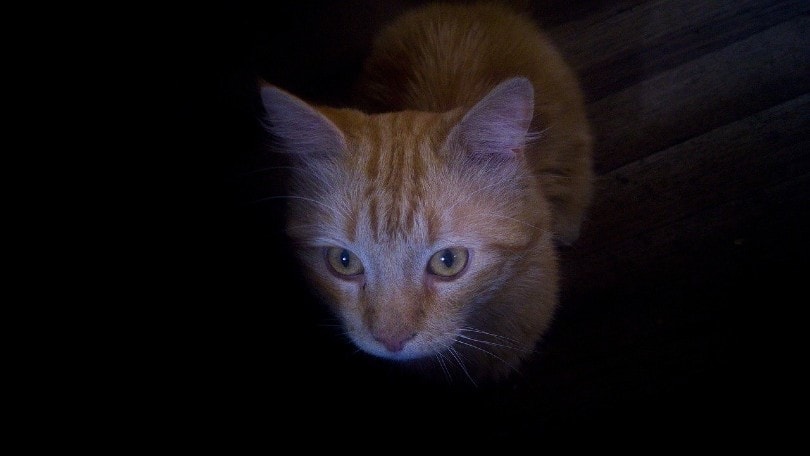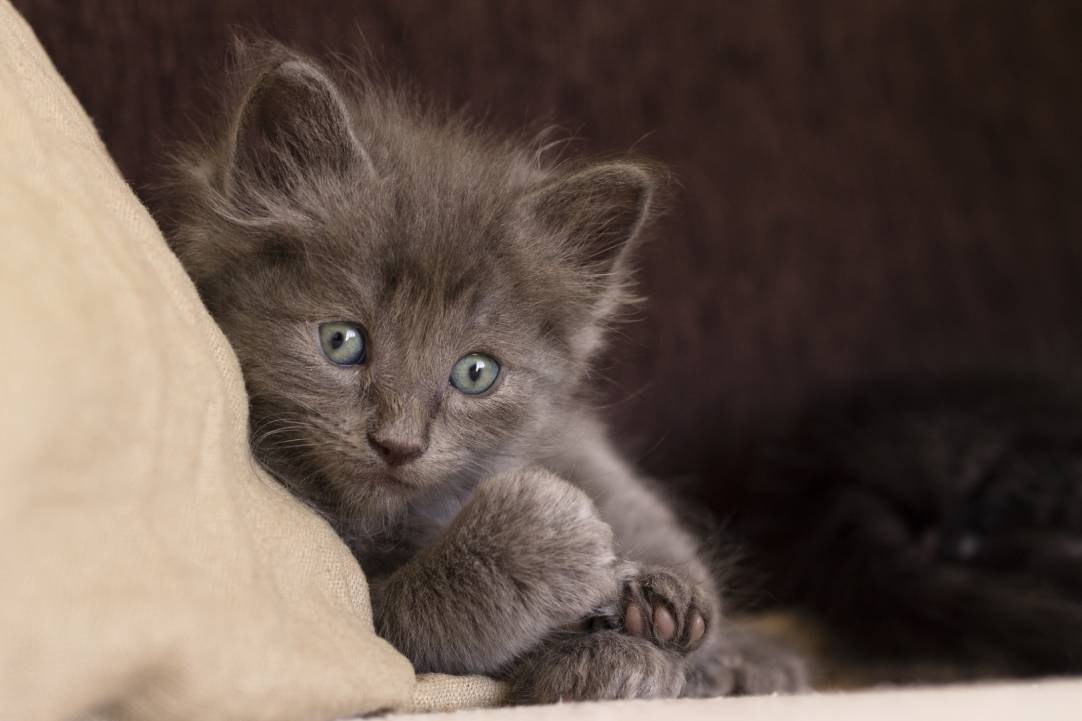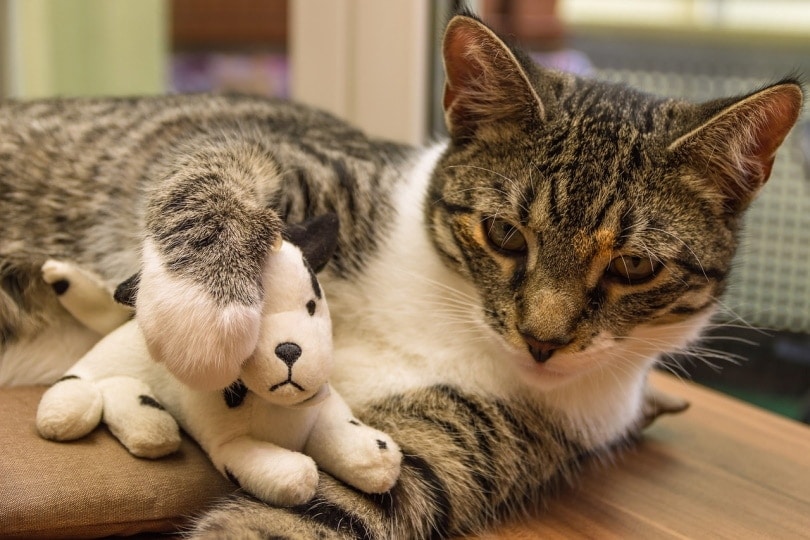Why Do Cats Make Weird Noises at Night? 7 Vet-Reviewed Reasons for This Behavior

Updated on

Cats are more active at dusk and dawn, and hearing them make a racket at night is not uncommon. From meowing, yowling, and trilling to sounds that you may have never heard them make before, you’d be forgiven for getting concerned about the strange noises that you may hear coming from your cat at night.
While some cats are naturally vocal, most are noisy for specific reasons. The noise is undoubtedly annoying, especially for the neighbors, but there are reasons for the behavior. If you’ve been wondering about the weird noises from your feline at night, you’ve come to the right place! Here, we look at seven reasons for this strange nocturnal behavior.
The 7 Reasons Cats Make Weird Noises at Night
1. Cats Are More Active at Night
The reason that your cat is making noise at night may be because they are more active at night. Most people think that cats are nocturnal, but they are actually crepuscular, meaning that they are more active during dawn and dusk. Cats often adjust to their owner’s routines and sleep through the night like us, but most will still have the instinct to be active during twilight hours.
This could result in various strange sounds because your cat may be play-hunting, stalking and pouncing, communicating with other cats, or simply exploring their environment and knocking things over. They may also be more active because they are unable to find a comfy spot to curl up for the night.
Finding a bed that your cat truly enjoys can be a challenge. Our Hepper Nest Bed features an enticing, portable design that encourages cats to explore and curl up in. Created with a comfy bowl shape to offer maximum support and a self-warming fleece insert, you’ll have a hard time getting your cat up from their daily naps.
- HAPPY COZY CATS - Your kitty will bask in luxurious sherpa-lined comfort while feeling warm, safe,...
- MODERN DESIGN - Contemporary styling with upholstered fabric construction; just like your human...
2. Stress and Fear
Some cats can be easily stressed, and even the most minor change in their environment can cause them to act in strange ways due to stress or anxiety. Moving to a new home can make them feel unsafe because they don’t have their preferred territory to roam.
A new routine or new pets in the home can also cause stress in your feline. This stress can lead to strange behaviors, including roaming around at night and making yowling or growling sounds as they adjust to their new normal.
3. Heat Related Behavior
If you have a female cat at home that hasn’t been spayed, she may be yowling at night because she is in heat and calling for a potential mate. Conversely, if you have a male, there may be a female in heat nearby, and he is trying to get to her.
This is why it’s best to get your female cats spayed and males neutered. It will eliminate the chance of any unwanted pregnancies and stop the yowling and meowing caused by heat behaviors.

4. Hunger
One common reason cats make strange noises at night is out of hunger or thirst. It could be possible that you’ve forgotten to feed them, haven’t fed them enough, or haven’t left any accessible water nearby. We’ve all heard our cats meowing and yowling when it’s close to their dinner time, and with all the other environmental noises around, it may not seem loud or out of the ordinary.
At night, when everything is quiet and still, this noise can be pretty alarming. Luckily, it’s easy to fix, and you should check their food bowls before bedtime. Of course, if you feed them the normal amount and they still seem hungry, there may be an underlying health issue, like diabetes, hyperthyroidism, or even internal parasites, and they may need a checkup with the vet.
5. Attention
Some cats may cry at night because they are under-stimulated or bored or haven’t had enough interaction during the day to tire them out. This could be attention-seeking behavior, and your cat may need more interaction than they are getting, or they are telling you that they want to go outside or come inside.
Try to add toys or interactive play to your cat’s routine to tire them out sufficiently during the day. This is especially important for indoor cats because they don’t have the same opportunities for climbing and playing, so you’ll need to add cat trees and perches to give them a chance for physical exertion.
Similarly, if you have an outdoor cat that is being kept inside at night, they may feel trapped and frustrated and are making noises because they want to go outside. There also may be something wrong with their litter box, and they may want to go outside to relieve themselves, if their litter box hasn’t been adequately cleaned or you changed the litter material to something they disapprove of.

6. Cognitive Dysfunction Syndrome (CDS)
CDS tends to affect senior cats but can affect younger felines, too. It affects their normal cognitive function and abilities. Unfortunately, the disease is not easy to diagnose. If your cat seems disoriented and confused and has changed their regular routine, such as being up more at night and making weird noises, seeming lost, staring into blank space, losing the interest in playing or food and water, toileting outside of the litter box, and others, they may suffer from cognitive decline. Some of the signs that may be attributed to CDS may also occur in case of other underlying medical health issues, and your cat should be checked out by the vet.
If you need to speak with a vet right now but can’t get to one, head over to JustAnswer. It’s an online service where you can talk to a vet in real time and get the personalized advice you need for your pet — all at an affordable price!
7. Pain or Illness
As already mentioned above, there are several health conditions that may occur in cats, particularly seniors, leading to excessive vocalization overnight. Some of these conditions include high blood pressure, hyperthyroidism, and kidney disease. They are usually accompanied by various changes in the cat’s demeanor, appetite, drinking, urination, defecation and mobility. Pain from injuries, wounds and arthritis can also lead to cats meowing excessively, which may occur overnight as well as in the daytime. If you suspect your cat is in pain or may be suffering from a health condition, get them checked out by your vet as soon as possible.
 Final Thoughts
Final Thoughts
Most of the time, your cat making weird noises at night is simply a case of cats being cats. Cats are crepuscular creatures that can get up to a fair bit of mischief at night, including startling sounds like loud yowling or meowing. Your cat may also feel trapped inside or is possibly hungry. In older cats, the nighttime noise may be a sign of CDS or other medical issues, and it’s best to take your cat to a vet for a checkup.
See also:
- Why Do Cats Stare at Walls? 5 Reasons for This Behavior
- Why Does My Cat Follow Me Everywhere? 7 Reasons for This Behavior
Featured Image Credit: mariavp, Pixabay












